The MEEP Lab runs workshops on methods for evolutionary analysis. Our annual Sydney Phylogenetics Workshop is held in July each year and is free to attend. We have also run workshops at other venues, including the National Herbarium of NSW, Australian National University, University of Melbourne, University of New South Wales, and University of Gothenburg (Sweden). Some of our workshops have been offered in conjunction with COMBINE or with the annual conference of the Genetics Society of Australasia.
A list of past workshops can be found here. If you would like to receive email notifications about future workshops, please contact Simon Ho.
Sydney Phylogenetics Workshop
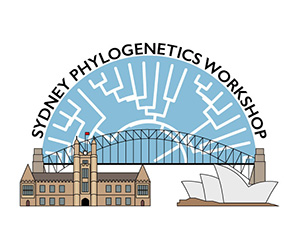
The MEEP Lab has run the annual Sydney Phylogenetics Workshop at the University of Sydney since 2010. This workshop provides an introduction to phylogenetic trees, evolutionary models, phylogenetic methods, maximum likelihood, Bayesian inference, molecular dating, and phylogenomics.
The 16th annual Sydney Phylogenetics Workshop was held on 26–27 June 2025 at the University of Sydney.
This free workshop was run in a partially hybrid format, with 40 in-person attendees and 70 online attendees. Priority was given to applicants who were: at early career stages (students and postdocs); from the Asia-Pacific region; and likely to derive the most benefit in the near future.
Recent workshops and conferences
15th Sydney Phylogenetics Workshop
27–28 June 2024
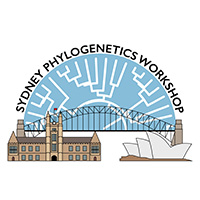
The 15th annual Sydney Phylogenetics Workshop was held at the University of Sydney on 27–28 June 2024.
Teaching materials from the workshop are available on Github. These include lecture slides and notes for the practical exercises.
14th Sydney Phylogenetics Workshop
27–28 July 2023

The 14th annual Sydney Phylogenetics Workshop was held at the University of Sydney, with 40 attendees. Speakers included members of the MEEP Lab (Yasmin Asar and Simon Ho) and Australian National University (Fred Jaya). Teaching assistants included Karen López and Toby Kovacs.
Day 1 of the workshop provided an introduction to phylogenetics, evolutionary models, phylogenetic data, phylogenetic analysis, and phylogenomics. Day 2 covered maximum-likelihood analysis using IQ-TREE, Bayesian phylogenetic analysis, and molecular dating. The workshop included supervised practical exercises using the software MEGA, IQ-TREE, and BEAST2.
Evolutionary analysis using PAML
20 & 23 January 2023
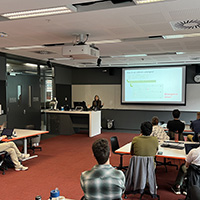
This advanced workshop was held at the University of Sydney and included talks and practical sessions on testing for selection in codeml and Bayesian phylogenomic dating in mcmctree. These applications are part of the PAML software package. The workshop was followed by a research seminar on the latest developments in the multispecies coalescent.
The workshop was delivered by Sandra Álvarez-Carretero and Ziheng Yang (University College London). Attendees included 23 researchers and students from the University of Sydney, Australian National University, Australian Museum, and Royal Botanic Gardens. The workshop was funded by a USYD-UCL Partnership Collaboration Award.
13th Sydney Phylogenetics Workshop
27–29 July 2022

The 13th annual Sydney Phylogenetics Workshop was held as an online event, with 100 attendees. Speakers included members of the MEEP Lab (Yasmin Asar and Simon Ho) and Australian National University (Fred Jaya and Minh Bui, author of IQ-TREE). Teaching assistants included Toby Kovacs, Nate Lo, Nhan Trong Ly, and Caitlyn Cherryh.
Day 1 of the workshop provided an introduction to phylogenetics, evolutionary models, phylogenetic data, and phylogenetic analysis. Day 2 covered maximum-likelihood analysis using IQ-TREE and Bayesian phylogenetic analysis. Day 3 covered molecular dating and phylogenomics. The workshop included supervised practical exercises using the software MEGA, IQ-TREE, BEAST2, and ASTRAL.
12th Sydney Phylogenetics Workshop
29–30 July 2021, University of Sydney

The 12th annual Sydney Phylogenetics Workshop was held as an online event, with 130 attendees. Speakers included members of the MEEP Lab (Yasmin Asar, Simon Ho, Fred Jaya, and Mezzalina Vankan), Minh Bui (author of IQ-TREE, Australian National University), and David Duchêne (University of Copenhagen).
Day 1 of the workshop covered interpreting phylogenetic trees, molecular data, evolutionary models, and phylogenetic methods, and maximum-likelihood analysis using MEGA and IQ-TREE. Day 2 provided an introduction to Bayesian phylogenetic analysis using BEAST2 and included MCMC sampling, molecular dating, and phylogenomics (using ASTRAL).
11th Sydney Phylogenetics Workshop
28–29 January 2021, University of Sydney

The 11th annual Sydney Phylogenetics Workshop was held as an online event, with 100 attendees. The workshop provided an introduction to phylogenetic analysis. Speakers included Simon Ho and Fred Jaya (University of Sydney), Minh Bui (author of IQ-TREE, Australian National University), David Duchêne (University of Copenhagen), and Barbara Brito-Rodriguez (University of Technology Sydney).
Day 1 of the workshop covered interpreting phylogenetic trees, molecular data, sequence alignment, evolutionary models, and phylogenetic methods, and maximum-likelihood analysis using IQ-TREE. Day 2 provided an introduction to Bayesian phylogenetic analysis and included models and priors, molecular clocks, estimating timescales, and pathogen phylodynamics.
Genomes and Biodiversity
20–22 November 2019, University of Sydney
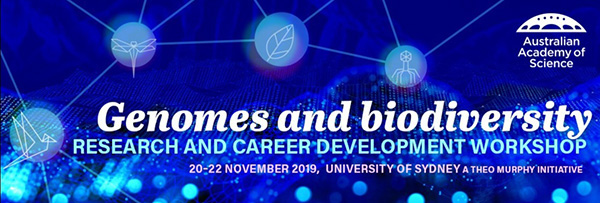
The Genomes and Biodiversity: Research and Career Development Workshop created a space for 50 EMCRs and research leaders from a range of disciplines to meet and share their research. The event was held over three days and included opportunities to attend talks from leading academics, present their research to a broad audience, receive hands-on training in analysis of big data, and participate in a career development workshop.
The workshop was sponsored by the Australian Academy of Science through the Theo Murphy Initiative, the University of Sydney, and the University of Copenhagen. The organising committee included EMCRs from the Australian Museum (Jackie Nguyen), Australian National University (Dan Rosauer, David Duchene, and Xia Hua), and University of Sydney (Cara Van Der Wal, Jackie Mahar, Mang Shi, Simon Ho).
10th Sydney Phylogenetics Workshop
15–16 July 2019, University of Sydney

The 10th annual Sydney Phylogenetics Workshop was held on 15–16 July 2019. The teaching team was led by Simon Ho (University of Sydney) and David Duchene (Australian National University), and included Nate Lo, Cara Van Der Wal, Perry Beasley-Hall, and Yi-Kai Tea.
This free two-day workshop provided an introduction to phylogenetic analysis, including practical exercises based on the software MEGA and BEAST2. Day 1 dealt with interpreting phylogenetic trees, molecular data, sequence alignment, evolutionary models, and phylogenetic methods. Day 2 provided an introduction to Bayesian phylogenetic analysis and includes Bayesian statistics, priors, and molecular dating.
Languages, Genes, and Prehistory
14 June 2019, University of Sydney
Linguistics and genetics have traditionally pursued different approaches to the reconstruction of human prehistories, applying different methods and often working at different time-scales). In recent years, however, research has emerged which attempts a direct correlation of linguistic and genetic indicators of population migrations, and a rapidly growing field of inquiry applies methods developed in the context of computational phylogenetics and cladistics to various types of language data to derive probabilistic models of language evolution and, therefore, language relationships.
This day-long interdisciplinary workshop brought together world-leading scholars to focus on intersections between theory and method in evolutionary biology and linguistics, with a special focus on the Asia-Pacific region. The workshop included talks by researchers from the University of Sydney (Mark Post, Paul Sidwell), Australian National University (Lindell Bromham, Xia Hua), and Universität Bern (George van Driem), as well as a software clinic run by Simon Ho.
Taming the BEAST Down Under
17–22 February 2019, University of Sydney
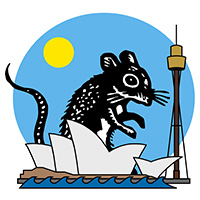
In February 2019 we hosted the week-long workshop Taming the BEAST Down Under, which focussed on Bayesian phylogenetic analysis using BEAST2. The workshop consisted of invited talks, lectures, and hands-on tutorial sessions given by core BEAST2 developers and experts in phylogenetics. The aim of the workshop was to provide participants with a firm grasp of the theory behind the methods central to phylogenetics, as implemented in BEAST2. The workshop covered Bayesian phylogenetics, phylogenetic model selection, molecular clocks, total-evidence dating, species trees and gene trees, and pathogen phylodynamics.
The teaching team included leading international and Australian reseachers from the University of Auckland, ETH Zurich, University of Sydney, Flinders University, University of Melbourne, and Australian National University. The workshop was organised by Simon Ho and several members of the MEEP Lab.